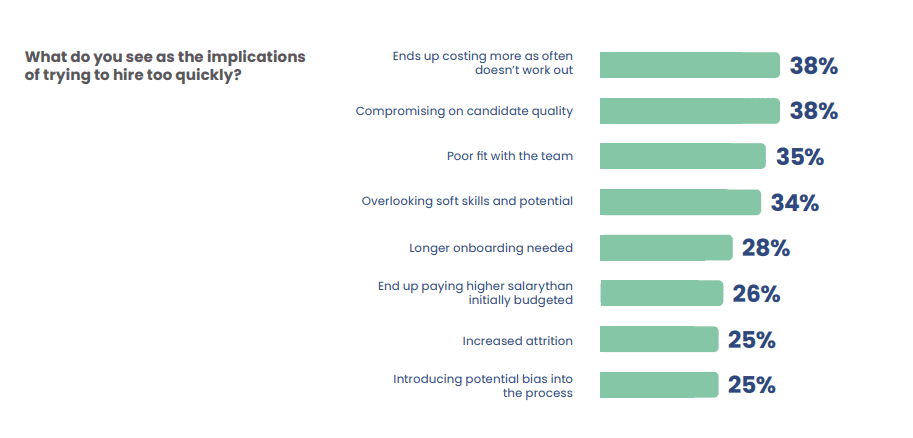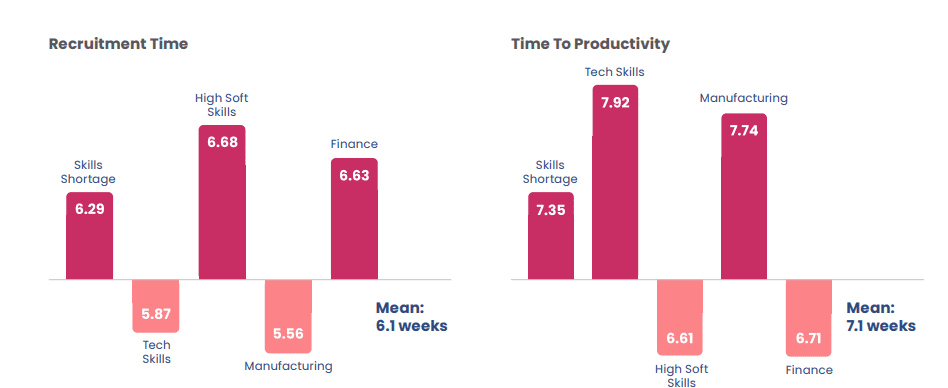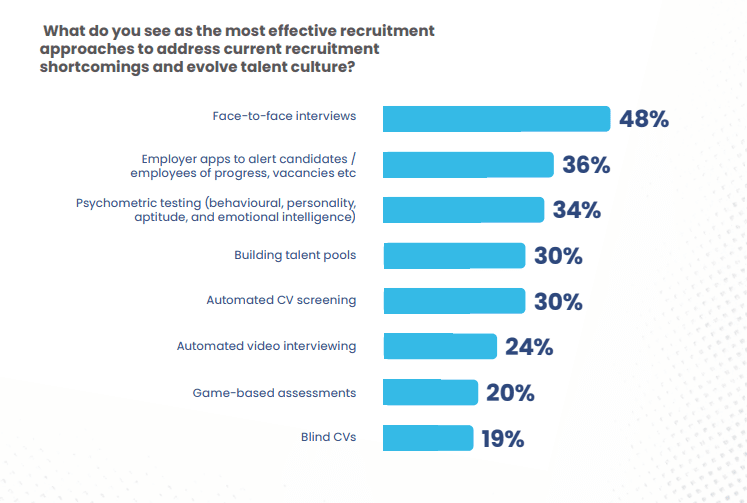Don’t rush your hiring process
Instead, focus on quality hires and bringing new employees up to speed quicker.
Why You Should Care
The tight labor market is making it harder and harder to hire.
This means HR are under increasing pressure to rush their recruitment process.
Here's what employers should be doing instead!
Recruitment has always been a challenge for HR teams. The ‘Great Resignation’ and a tight labor market has only made the situation worse for HR teams, and they are feeling the squeeze, according to new research by Thomas International.
Recruitment is a “high-stakes process”, which is under scrutiny by everyone across the business”, notes CEO Luke McKeever.
Thomas International surveyed 900 HR leaders from across the world and found that three in five have had a poor recruitment experience since COVID-19 began, with three-quarters saying this because of multiple pressures on the process.
The main pressure they are facing is the need to hire quickly, but HR knows this is a bad move since it often leads to poor hires. When asked about the main issues with rushing the hiring process, the top response (38%) was it ‘ends up costing more as the hire doesn’t work out’.
74% know they are compromising on candidate quality in order to fill roles faster due to business pressures, and 76% said that hiring too fast is leading to poor hires.

Credit: Thomas International’s The Talent Time Bomb.
HR professionals told Thomas International that just 40% of the hires they’ve made in the last two years are working out in all areas – and 28% haven’t worked out.
Of those that didn’t work out, 49% of HR professionals said that it was because of poor fit between the candidate and the role, 41% said it wasn’t a good culture fit and 9% said the candidate didn’t click with their manager.
Re-focus on soft skills to improve hiring
McKeever tells UNLEASH: “The answer is simple: businesses need to transform their approaches to recruitment, onboarding and talent retention. But the time they have left to change is ticking away before serious financial and competitive consequences kick in.”
The first thing that Thomas International’s report recommends that employers must do is to move away from rushing their hiring process, and instead focus on getting new hires up to speed and productive in their roles quicker.
To do this, Thomas International recommends that companies move away from prioritizing hard, technical skills in the interview – and instead, they should re-focus on soft skills. The issue is that organizations are facing a skills crisis (48%), and primarily in soft skills (43%).
“Businesses that value hard skills fill roles slightly faster, but take notably longer to bring up to productivity. Conversely, businesses who place a higher value on soft skills take slightly longer to recruit,” noted the report.
“But they take less time to bring candidates up to optimal productivity – indicating that while soft skills are harder to find, these candidates have qualities that help them get up to speed quicker.”

Credit: Thomas International’s The Talent Time Bomb.
Those that embrace soft skills and productivity (rather than rushing their hiring) are also more agile and adaptable.
This is crucial; the report stated: “If the COVID-19 pandemic has proven anything, it’s that agility and adaptability are critical to business success, enabling organizations and their people to thrive in the face of external chaos.
How to hire for soft skills
The good news is that HR teams are ready to make changes – 63% of those surveyed want to evolve and adapt how they approach recruitment and they are aware of the consequences of doing nothing (38% worry about wasting on money and resources, and deepening the skills shortage if they wait).
The changes they need to make include face-to-face interviews and psychometric testing to help them evaluate employee’s interpersonal skills.
They also need to leverage an employer app that will help them better communicate with candidates, as well as allow them to track their progress.

Credit: Thomas International’s The Talent Time Bomb.
This is crucial as other research is finding that clunky, manual recruitment processes are turning off candidates. For instance, Bullhorn’s recent research found that 75% of younger job candidates are abandoning job applications because of the manual process.
McKeever concludes: “Some businesses are racing ahead, evolving to adopt a progressive talent culture that delivers greater productivity and workforce agility.
“These will be the companies that can reap the rewards of a strong talent culture, rising above the issues within the labor market to successfully navigate the uncertain economic conditions that lie ahead.”
A looming recession is already impacting talent budgets, with many companies implementing hiring freezes beyond essential roles.
“Squeezed talent budgets may well mean fewer open roles, but costs will be more carefully measured, and the urgency of getting every single hire right will only grow” – so it is crucial that employers and HR teams act now to improve the quality of their hiring.
The world’s HR conference and expo is back! Don’t miss out on UNLEASH World in Paris this October.
Sign up to the UNLEASH Newsletter
Get the Editor’s picks of the week delivered straight to your inbox!

Chief Reporter, UNLEASH
Allie is an award-winning business journalist and can be reached at alexandra@unleash.ai.
Contact Us
"*" indicates required fields
Partner with UNLEASH
"*" indicates required fields